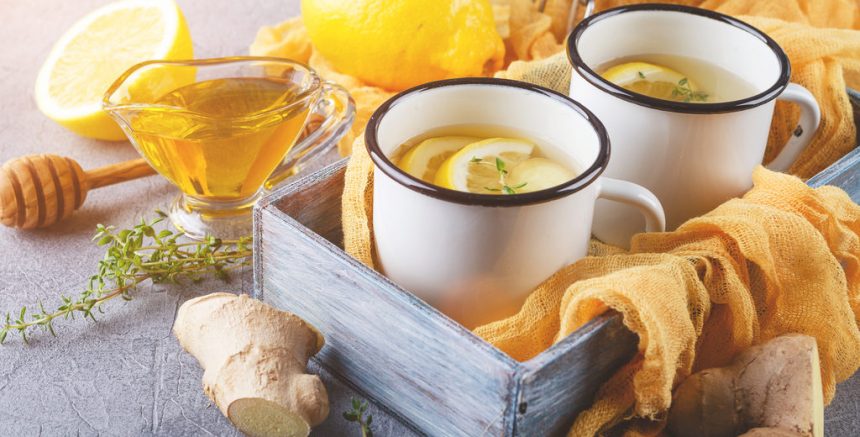Colds and flu are viral illnesses that infect your upper respiratory tract, causing symptoms such as chest congestion, runny nose, watery eyes and cough. Influenza, more commonly known as the flu, can also cause fever, nausea and vomiting. The average adult is sick with the common cold two to four times each year. Another 15% to 20% get the flu.
Since these illnesses are caused by a virus, they can’t be stopped completely. But you can relieve your symptoms.
Although there is no cure for either of these illnesses, there are a lot of natural options that can shorten the duration of the illness and lessen the symptoms
THYME TEA:
The next time you have a cold or cough, try a cup of thyme tea. The University of Maryland Medical Center says it can help treat bronchitis and relieve coughs, and states that thyme has been approved for this use by the German Commission , which evaluates safety and efficacy of herbal preparations in Germany. Drugs.com concurs, saying that extracts from thyme have shown relaxant and bronchodilatory effects.

YARROW TEA:
The British Herbal Compendium notes that preparations of yarrow lower fevers, induce sweating, stop cramps, encourage menstruation, relieve inflammation, and stimulate the release of stomach acid to digest proteins and fats. The herb is taken internally to treat colds, fevers, and indigestion, and used in skin treatments of slow-healing wounds. The founded flavonoids in this tea are relaxing the bronchial muscles that are responsible for cough;

PEPPERMINT TEA:
peppermint tea has menthol as a main component, so drinking the tea can cause external sweating, while the menthol cools down your body internally. This can essentially break a fever and reduce the associated inflammation and discomfort.
OREGANO TEA:
Oregano is a wonderful natural treatment for nasal congestion as it works as a safe and reliable antihistamine. To clear blocked throat and nasal passages, add two or three drops of oregano oil to one-half cup of boiling water. Cover your head with a towel and inhale the vapor coming off the mixture. Do this twice daily.
The antiviral property in oregano can effectively shorten the duration of flu symptoms.
BEE BALM TEA:
Due to the presence of a high thymol content which is a strong antiseptic (also in thyme), Monarda or Bee Balm has been used in infusion form for a variety of ailments in its long past: colds, flu, upper respiratory problems, gas, diarrhea, nausea, fevers and whooping cough, and topically for skin problems and wounds.

GINGER TEA:
Tea made from ginger has high levels of vitamin C and amino acids, as well as various trace elements such as calcium, zinc, sodium, phosphorus, and many others.
The Journal of Microbiology and Antimicrobials published a study in 2011 that tested just how effective ginger is in enhancing immune function. Comparing the ability of ginger to kill Staphylococcus aureus and Streptococcus pyogenes with conventional antibiotics, Nigerian researchers discovered that the natural solution won every time!
Ginger tea can help relieve congestion associated with the common cold. Try a cup of ginger tea for the respiratory symptoms associated with environmental allergies.
ELDER FLOWER TEA:
Elder flowers, also called European elder, have a long history of use in traditional German medicine. They have antioxidant properties and an antiviral effect, which is why they’re still popularly used to help fight off colds and flu. Elder flowers can be brewed as an herbal tea; A study published in the “Online Journal of Pharmacology and PharmacoKinetics” in 2009 found that elder flower extract is very effective in treating flu symptoms.

ECHINACEA TEA:
Echinacea tea is another great tea for cold and flu; Because of its immune-boosting and anti-inflammatory effects, echinacea can be used to relieve the upper respiratory symptoms as: Acute sinusitis, All flu’s, Common cold, Croup, Strep throat and Whooping cough;
How to make your Herbal Tea:
To make your tea, simply boil 1 quart of water per ounce of herb (or 1 cup of water to 1 tablespoon of herb). Pour water over the herb(s) and let steep for 30 to 60 minutes. The proportion of water to herb and the required time to infuse varies greatly, depending on the herb;
You can use 2-3 herbs together and make your tea;
By Dr. Fatemeh Aghanasiri, M.D. (MCC) – Medicentres, Al Furjan- Motorcity


Leave a Reply